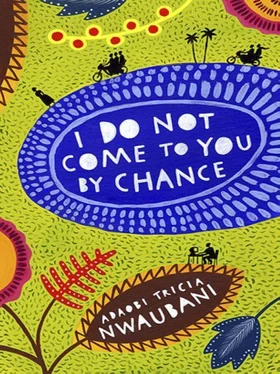
Adaobi Tricia Nwaubani
I Do Not Come to You by Chance
© 2009
To my parents…
Chief Chukwuma Hope Nwaubani (Ahanyiefule 1 of Omaegwu, Oke Orji Abia)
Chief Mrs Patricia Uberife Nwaubani (Nwanyiejiagamba 1 of Omaegwu)
… for giving me the very best of their best.
People in the villages seemed to know everything. They knew whose great-grandmother had been a prostitute; they knew which families were once slaves of which; they knew who and who were osu outcasts whose ancestors had been consecrated to the pagan shrines of generations ago. It was, therefore, not surprising that they knew exactly what had happened in the hospital on that day.
From what Augustina had been told, as soon as she came into the world and the midwife smacked her buttocks so that she could cry and force air into her lungs, her mother took in a deep breath and died. The dead woman was the most recent of five wives, the youngest, and the most beloved. But because she had died a bad death, a death that was considered as much an abomination as a suicide, she was buried immediately, quietly, without official mourning.
When Augustina’s father took her home, everybody complained that the child cried too much, as if it knew that it had killed its mother. So her grandmother came and took her away. At age seven, when it was confirmed that her right hand could reach across her head and touch her left ear, Augustina moved back to her father’s house and started attending primary school. Being long and skinny had worked to her advantage.
Six years later, the same village experts said it was foolish for her father to consider sending a female child to secondary school. It was a waste of time; women did not need to know too much ‘book’. Reverend Sister Xavier was outraged and came all the way to talk it out with Augustina’s father.
‘Good afternoon, Mr Mbamalu,’ she began.
‘Welcome,’ he said, and offered her a seat.
The white woman sat and stared right into his eyes.
‘I hear you’re not allowing Ozoemena to attend secondary school.’
Ugorji, Augustina’s elder brother, who had been assigned as interpreter for the day, repeated the woman’s words in Igbo. It was not as if their father did not understand English, but when he received word that the headmistress was coming, he had panicked, fearing that his feeble grasp of the foreign language would not withstand the turbulence of the white woman’s nasal accent and fast talking.
‘I want her to learn how to cook and take care of a home,’ Augustina’s father replied. ‘She has gone to primary school. She can read and write. That is enough.’
The white woman smiled and shook her head.
‘I’m sorry to disagree with you, but I don’t think it’s enough. Ozoemena is such a smart girl. She can go a very long way.’
Ugorji did his thing. The white woman sped on.
‘I’ve been living in Africa since the thirties. In all my over twenty years of missionary work here, I’ve come across very few young women as smart as your daughter.’
Sister Xavier sat upright, hands clasped as if she was in a constant state of preparedness for prayer.
‘All over the world,’ she continued, ‘women are achieving great things. Some are doctors who treat all types of diseases, others have big positions with the government. You might be surprised to hear this, but in some countries, the person who rules over them is a woman.’
From her position behind the door, Augustina noticed that her brother did not give the correct interpretation for the word ‘rules’. It was little things like this that made her the smart one.
‘Mr Mbamalu, I would like you to reconsider your stand on this matter,’ Sister Xavier concluded.
To date, nobody is sure if it was the sister’s words, or the rapid way she fired her sentences, or simply the shock of a woman telling him what to do, but Augustina’s father consented. She would attend secondary school with her brothers. Another five years of the white man’s wisdom.
Augustina was thrilled.
In the end, though, it did not matter that she had made the highest scores in her class during the final-year exams, or that she spoke English almost with the same speed as the reverend sisters themselves. After secondary school, the topic of formal education was officially closed and Augustina was sent as an apprentice to her father’s sister who was a successful tailor. Her aunty was married to a highly esteemed teacher. So highly esteemed, in fact, that everybody called him Teacher. That was how she left Isiukwuato and moved to Umuahia.
Augustina had been living with Teacher and Aunty for some months when news reached them that one of Teacher’s friends was coming to visit. The friend had studied Engineering in the United Kingdom, was now working with the government in Enugu, and was returning to Umuahia for his annual leave. As soon as his letter arrived, Aunty went about broadcasting the news to all the neighbours. Most of them knew the expected guest from reputation. They said he was good-looking. They said he always wore shoes, even when he was just sitting inside the house reading. They said he behaved like a white man, that he spoke English through his nose and ate with a fork. Some even swore that they had never known him to fart.
When Engineer turned up in his white Peugeot 403, Augustina, Aunty, Teacher, and the five children were dolled up in their Sunday best and waiting on the veranda. As soon as Augustina caught that first glimpse of him, she decided that even if Engineer’s steps had not been leading to their courtyard, she would have crawled over broken glass, swum across seven oceans, and climbed seven mountains to see him that day. He was as handsome as paint. His back was straight, his hands stayed deep inside his pockets, and his steps were short and quick as if he had an urgent appointment at the end of the world. Anybody passing him on the way to the stream could have mistaken him for an emissary from the spirit world on special assignment to the land of mere mortals.
After lunch, they all sat in the living room. Engineer crossed his right leg over his left knee and reeled out tales of the white man’s land.
‘There are times when the sun doesn’t shine,’ he said. ‘The weather is so cold that even the plants are afraid to come out of the ground. That’s why their skin is so white. Our own skin is much darker because the sun has smiled too long on us.’
They opened their mouths and opened their eyes, and looked at themselves from one to the other.
‘During those times, the clothes they wear are even thicker than the hairs on a sheep. And if they don’t dress that way, the cold can even kill.’
They opened their mouths and opened their eyes, and looked at themselves from one to the other.
‘The way their streets are, you can be walking about for miles and miles and you won’t even see one speck of sand. In fact, you can even wear the same clothes for more than one week and they won’t get dirty.’
They opened their eyes and opened their mouths, and looked at themselves from one to the other. If anybody else had narrated these stories, they would have known immediately that he had spent far too much time in the palm wine tapper’s company.
‘That’s why education is so important,’ Engineer concluded. ‘These people have learnt how to change their world to suit them. They know how to make it cold when the weather is too hot and they know how to make it hot when the weather is too cold.’
He paused and leaned back in his chair. Then he beamed the starlight on someone else.
Читать дальше






![Майкл Азеррад - Come as you are - история Nirvana, рассказанная Куртом Кобейном и записанная Майклом Азеррадом [litres]](/books/392533/majkl-azerrad-come-as-you-are-istoriya-nirvana-ra-thumb.webp)






